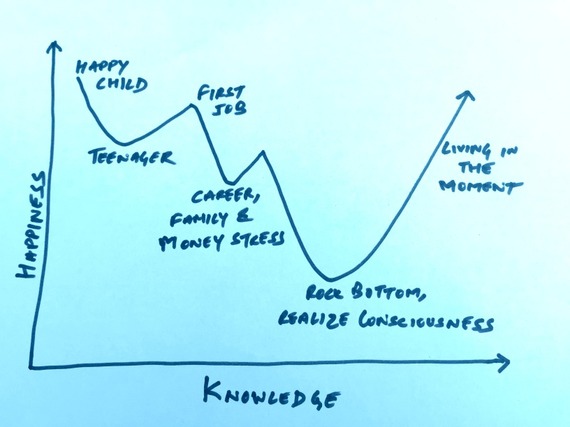 Happiness graph by Sweta Saraogi. Don't wait for rock bottom to connect with your consciousness. Live in the moment!
Happiness graph by Sweta Saraogi. Don't wait for rock bottom to connect with your consciousness. Live in the moment!
I once asked a common man "what is happiness?" He replied "happiness is subjective to once knowledge."
It got me thinking about what constitutes knowledge. My yoga teacher once said, "knowledge is a projection of mind based on our own reality."
The database of our minds includes memories and worries of past, present and future. These determine our reality of who we are and what we are meant to be. The success of our reality is measured by the society we live in. But truly our reality is defined by the trinity (politicians, corporations and priests) of the society. They teach us what they want us to learn.
The trinity gets us so lost and entangled into the rat race of competition, religion and status that we lose the purpose of life. We run so fast to meet the demands of a good life -- or what the trinity defines as a good life -- that we forget living in this moment. And before we know life is over. So, if our knowledge is subjective to what has been taught to us, how can our happiness be organic?
As a middle class individual, raised in a developing country like India, I was taught that money equals happiness. My knowledge told me that making money and spending it on travel, clothes and things will give me good life. Again, I say good life, as defined by the trinity.
This knowledge got me to America, a developed country. I joined the rat race and did everything exactly as I was taught. I was happy but something felt weird. I had everything, a house, car, family and a job that paid over $100 thousand but my happiness wasn't organic.
Then I stumbled upon yoga and it shook my complete belief system. Yoga taught me to slow down, breathe in the moment and observe. With observation, I realized that I was living with limited knowledge and until then I had truly never tapped into my consciousness. My foundation of happiness was flawed. So, I started my research for the meaning of consciousness.
I spent years on self-study, contemplation and observation through meditation, yoga and reading. I even traveled the globe from Japan to India to UK to Europe, having discussions and conversations with learned individuals about consciousness. They all had one theme in common, "be present".
Consciousness is a state when we are living in the present, when we embrace every experience with an open heart.
Someone once told me that "you are having an experience right now because you need to. Not all experiences are good but you learn something from each and every one of them." I believe it is better to have it experienced and failed rather than not experience at all. That gives me happiness. When I am present to embrace every experience as a learning in life, I am living with my consciousness.
If you are not completely present in the moment, how would you know that you are truly happy? And if you don't know that you are truly happy, you won't live up to it or for that matter even experience it organically.
Inorganic or flawed happiness has a temporary effect like fast food. Its tastes good at first but does nothing for the soul of the body. It is so superficial that it never even touches our consciousness just sits in the database of our mind as knowledge. We thus tend to recreate it again and again by looking for the same fast food corner though miles away without paying any attention to the organic farm right next door.
This is an example of flawed knowledge: if from a young age the trinity teaches us junk food gives us happiness, we continue to seek happiness by eating it. But by thoughtlessly consuming junk food -- not stopping to be present in the moment and ask ourselves if it's really making us happy -- we are inorganically happy.
I am not saying that in order to be happy we need to live in the forest, not wear decent clothes, relish a burger or drive a good car. As an urban mystic, I still enjoy these, but I don't rely on these for my happiness. I believe organic happiness should not come from knowledge but from actual life experiences.
The question we all need to ask ourselves is, are we conscious enough to experience true happiness?